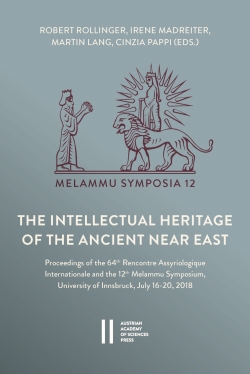
The Intellectual Heritage of the Ancient Near East, pp. 407-430, 2023/04/12
Proceedings of the 64th Rencontre Assyriologique Internationale and the 12th Melammu Symposium, University of Innsbruck, July 16‒20, 2018
To what extent were Alexander and his successors the heirs of the Achaemenids? To answer this question, this article discusses the development of kingship in the Near East in the period of Macedonian domination (c. 330–140 BCE). Ideas about kingship belong to the most persistent intellectual heritage of the ancient Near East throughout the millennia, especially universalistic imperial ideology. The focus is on the Seleucid dynasty. It is argued that universalistic ideology served the purpose of creating cohesion in multicultural empires, an instrument of empire used to overcome internal political diversity and to bring together local elites under a single cosmopolitan umbrella. In emphasizing universalism’s practical function and its specific use by the Seleucids, the article questions the usefulness of the concept of “continuity” that dominates current views of the Near East during the so-called Hellenistic period.